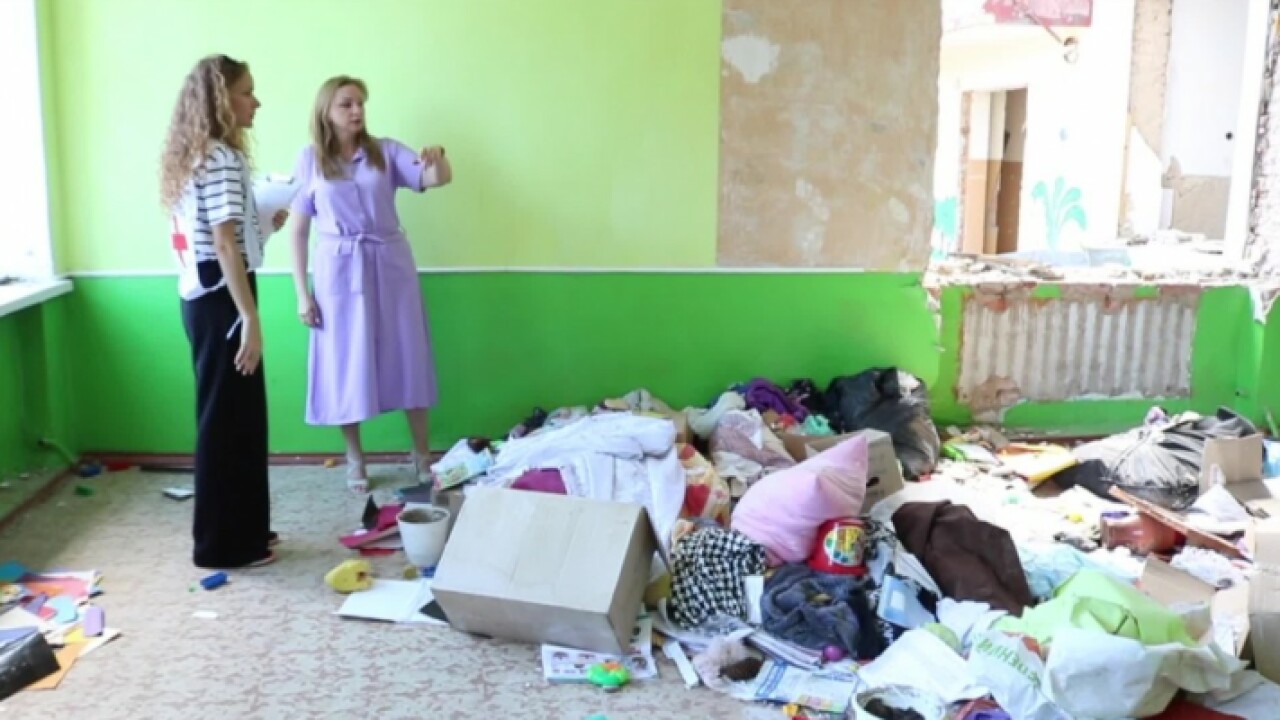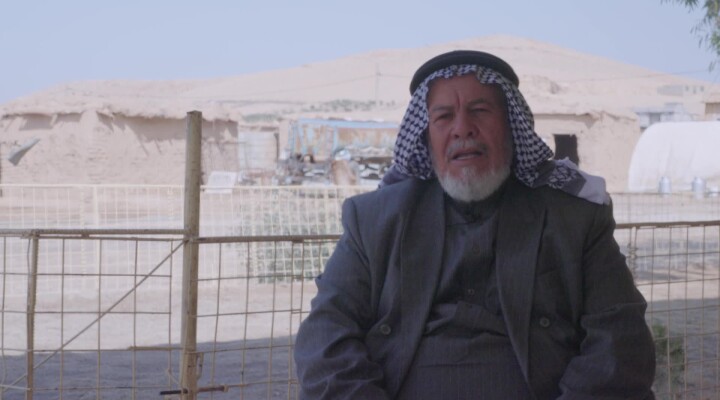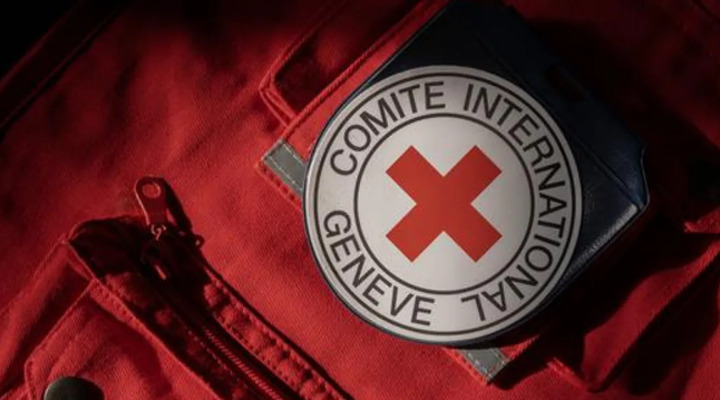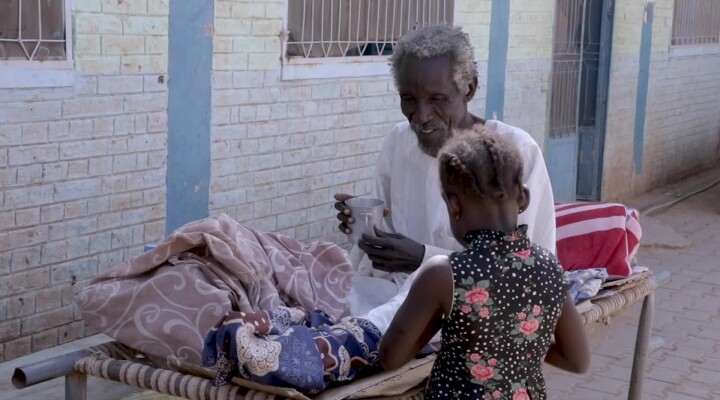Ukraine: Amid years of disruption, students go back to school

This is a modal window.
Lockers with tiny schoolbags and changes of shoes are blown open. Piles of rubble and debris obscure the cartoon figures on the brightly painted walls. Notebooks and schoolbooks lie on the ground, pages fluttering in the wind.
This is what a school yard hit affected by fighting in Ukraine looks like.
As students of all ages return to the classroom this month, parents and headmasters must deal with the fact that thousands of schools have been damaged or destroyed across the country as a result of the international armed conflict, robbing children and teenagers of the safe space they need to learn and grow.
“It is very hard because even before the war we had two years of the Covid-19 pandemic, and children studied online. We were concerned for the life and safety of the children,” says Irina Mykolaivna Voloshchenko, head of the Department of Education, Youth, and Sports of the Makariv Village Council.
Voloshchenko and other teachers welcomed some students back on their first day of school on 1 September. But now teachers across the country must deal with the dangers of teaching during the armed conflict.
“With groups of 20 to 25 children, how can you prepare them and quickly take them to a shelter when you don’t know how much time you have left until a missile or a bomb hits? It is very hard. Most importantly to children because they should receive high-quality learning services in appropriate, undamaged, modern schools and kindergartens,” Voloshchenko said.
For areas like Makariv, Kyiv region, that were on the front lines in the springtime, many of the educational facilities that served the area were heavily damaged or destroyed. According to Irina, 17 of the 24 schools in the Makariv territorial Hromada have been damaged. In addition, six of the Hromada’s 12 kindergartens have been damaged and two destroyed.
Since February 2022, hostilities in Ukraine have impacted the entire school-aged population – 5.7 million children aged 3 to 18 – due to the nation-wide closure of schools and other education facilities. UN OCHA estimates that 5 million children are in need of basic school infrastructure, especially in conflict-hit areas in the Donetsk and Luhansk regions, as well as in southern and northern parts of Ukraine. Children with disabilities are disproportionately affected. Education infrastructure has been badly impacted with over 2,100 facilities damaged and 270 destroyed to date, according to the Ukrainian Ministry of Education.
Some schools in other areas of the country have been taken over by other realities of the armed conflict: many are now being used to host displaced families and cannot be used for teaching.
Across areas affected by hostilities, we have helped repair dozens of schools and is providing blast film and tarpaulin to schools along or near frontlines as preventative measures. But the fact that we are doing this work underscores the horrific reality that parents now navigate, constantly questioning whether it is safe to send their children to school.
While the new academic year just beginning, many schoolchildren have connected with their teachers online. Not all children or teachers have access to the IT devices or the connectivity that they need. To support continuity of education for students, we have been giving IT resources to schools and educators. We have also been giving cash to families to help them meet some of these needs.
The ICRC delegation in Ukraine has been responding to needs in frontline communities since 2014. Since February 2022, it continues with activities including supporting repairs to damaged buildings, distribution of learning materials, Mental Health and Psychosocial Support for Teachers, Risk Awareness and Safe Behaviour training, and protection of education through humanitarian dialogue with the parties to the conflict.
For further information, please contact: Jennifer Sparks (English), ICRC,+41 79 217 3200, jsparks@icrc.org
00:00:00 --> 00:00:07
Iryna Mykolaivna Voloshchenko walking to a kindergarten
00:00:07 --> 00:00:13
Iryna Mykolaivna Voloshchenko walking up the stairs
00:00:13 --> 00:00:20
Iryna Mykolaivna Voloshchenko in front of the kindergarten
00:00:20 --> 00:00:27
Iryna Mykolaivna Voloshchenko's hands while talking
Iryna Mykolaivna Voloshchenko: It’s such an emptiness. There was a single wish – to come back home...
00:00:27 --> 00:00:40
Iryna Mykolaivna Voloshchenko in front of the kindergarten
Anastasiia Mykhailova, ICRC: It’s really sad.
Iryna Mykolaivna Voloshchenko: I don’t even know… When we came here, came in, it felt as in a movie.
00:00:40 --> 00:02:05 Soundbite Iryna Mykolaivna Voloshchenko, Head of the Department of Education, Youth, Fitness and Sports of the Makariv Village Council
00:00:40 --> 00:00:56
After the war started, education has changed dramatically. A number of educational institutions have been destroyed. In particular, in our Makariv community, there are 24 schools and 17 of them have been damaged to a varying degree.
00:00:56 --> 00:01:15
We also have 12 kindergartens, six of them have been damaged and two are completely destroyed. They need to be rebuilt very quickly because the new school year is going to begin very soon. Children ought to sit down at their desks at their respective schools.
00:01:15 --> 00:01:31
When you see curtains flapping in shattered windows, it gives you a sense of emptiness. There were very few people around. Emptiness and devastation. And you don’t know what is going to come next.
00:01:31 --> 00:01:47
We try to conduct accident prevention activities in order to restore the schools. Regarding kindergartens, we are now standing before one of them. It has been destroyed along with another one. Just one out of three kindergartens in Makariv currently remains.
00:01:47 --> 00:02:04
But of course, we try to restore everything, to resume the education process and give hope to parents, teachers and children. Most importantly to children because they should receive high-quality learning services in appropriate, undamaged and modern schools and kindergartens.
00:02:04 --> 00:02:21
Kindergarten's entrance
00:02:21 --> 00:02:31
Iryna Mykolaivna Voloshchenko inside the kindergarten
Anastasiia Mykhailova, ICRC: The catering unit was here?
Iryna Mykolaivna Voloshchenko: Here we had catering unit, and there we had sleeping room for the kids.
00:02:31 --> 00:02:40
Iryna Mykolaivna Voloshchenko inside the kindergarten
Iryna Mykolaivna Voloshchenko: Little ballerinas were here, then we put up other things [as decorations]. Parents themselves were doing the handicrafts.
00:02:40 --> 00:02:56
Iryna Mykolaivna Voloshchenko in the locker room
Iryna Mykolaivna Voloshchenko: There are still child’s belongings. Dancing slippers and toys. Who do they belong to?
00:02:56 --> 00:03:09
Rubbles and notebooks on the kindergarten's floor
00:03:09 --> 00:03:21
Rubbles and toys on the kindergarten's floor (2 shots)
00:03:21 --> 00:03:44
Iryna Mykolaivna Voloshchenko on the roof (2 shots)
Iryna Mykolaivna Voloshchenko: If you need, I can send you photos of the kindergarten inside. I sent some to Inter TV channel. I have some, I can send if needed.
00:03:44 --> 00:03:54
View from the roof
00:03:54 --> 00:03:59
Destroyed bicycle
00:03:59 --> 00:04:06
Destroyed cars
00:04:06 --> 00:04:22
Street of Makariv with destroyed buildings


